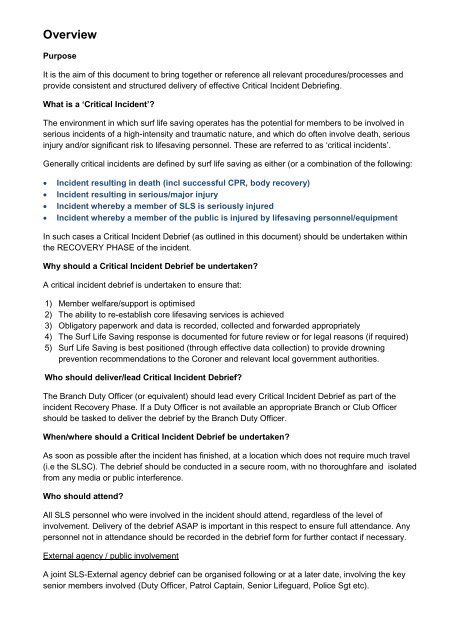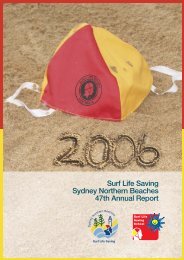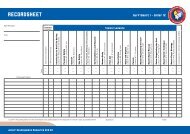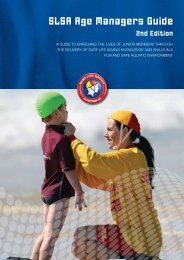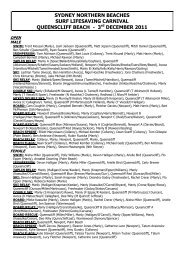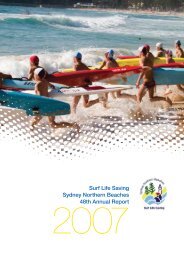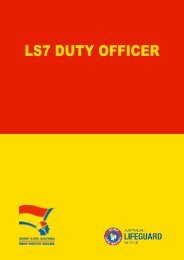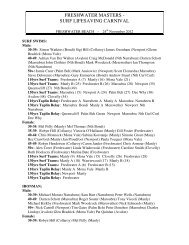Critical Incident Debrief Flow-Chart - Surf Life Saving NSW
Critical Incident Debrief Flow-Chart - Surf Life Saving NSW
Critical Incident Debrief Flow-Chart - Surf Life Saving NSW
You also want an ePaper? Increase the reach of your titles
YUMPU automatically turns print PDFs into web optimized ePapers that Google loves.
Overview<br />
Purpose<br />
It is the aim of this document to bring together or reference all relevant procedures/processes and<br />
provide consistent and structured delivery of effective <strong>Critical</strong> <strong>Incident</strong> <strong>Debrief</strong>ing.<br />
What is a „<strong>Critical</strong> <strong>Incident</strong>‟?<br />
The environment in which surf life saving operates has the potential for members to be involved in<br />
serious incidents of a high-intensity and traumatic nature, and which do often involve death, serious<br />
injury and/or significant risk to lifesaving personnel. These are referred to as ‘critical incidents’.<br />
Generally critical incidents are defined by surf life saving as either (or a combination of the following:<br />
<br />
<br />
<br />
<br />
<strong>Incident</strong> resulting in death (incl successful CPR, body recovery)<br />
<strong>Incident</strong> resulting in serious/major injury<br />
<strong>Incident</strong> whereby a member of SLS is seriously injured<br />
<strong>Incident</strong> whereby a member of the public is injured by lifesaving personnel/equipment<br />
In such cases a <strong>Critical</strong> <strong>Incident</strong> <strong>Debrief</strong> (as outlined in this document) should be undertaken within<br />
the RECOVERY PHASE of the incident.<br />
Why should a <strong>Critical</strong> <strong>Incident</strong> <strong>Debrief</strong> be undertaken?<br />
A critical incident debrief is undertaken to ensure that:<br />
1) Member welfare/support is optimised<br />
2) The ability to re-establish core lifesaving services is achieved<br />
3) Obligatory paperwork and data is recorded, collected and forwarded appropriately<br />
4) The <strong>Surf</strong> <strong>Life</strong> <strong>Saving</strong> response is documented for future review or for legal reasons (if required)<br />
5) <strong>Surf</strong> <strong>Life</strong> <strong>Saving</strong> is best positioned (through effective data collection) to provide drowning<br />
prevention recommendations to the Coroner and relevant local government authorities.<br />
Who should deliver/lead <strong>Critical</strong> <strong>Incident</strong> <strong>Debrief</strong>?<br />
The Branch Duty Officer (or equivalent) should lead every <strong>Critical</strong> <strong>Incident</strong> <strong>Debrief</strong> as part of the<br />
incident Recovery Phase. If a Duty Officer is not available an appropriate Branch or Club Officer<br />
should be tasked to deliver the debrief by the Branch Duty Officer.<br />
When/where should a <strong>Critical</strong> <strong>Incident</strong> <strong>Debrief</strong> be undertaken?<br />
As soon as possible after the incident has finished, at a location which does not require much travel<br />
(i.e the SLSC). The debrief should be conducted in a secure room, with no thoroughfare and isolated<br />
from any media or public interference.<br />
Who should attend?<br />
All SLS personnel who were involved in the incident should attend, regardless of the level of<br />
involvement. Delivery of the debrief ASAP is important in this respect to ensure full attendance. Any<br />
personnel not in attendance should be recorded in the debrief form for further contact if necessary.<br />
External agency / public involvement<br />
A joint SLS-External agency debrief can be organised following or at a later date, involving the key<br />
senior members involved (Duty Officer, Patrol Captain, Senior <strong>Life</strong>guard, Police Sgt etc).


